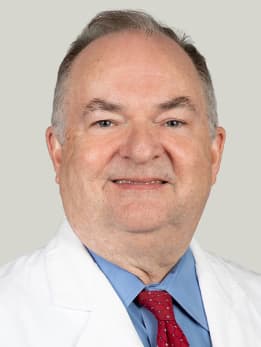Tumor-Infiltrating Lymphocyte (TIL) Therapy
A Groundbreaking Cancer Treatment for Advanced Melanoma
Tumor-infiltrating lymphocyte (TIL) therapy is an innovative new cancer treatment for patients with advanced melanoma. TIL therapy is a type of cellular immunotherapy that can help your immune system kill cancer cells when other treatments have failed.
Tumor-infiltrating lymphocytes are your body’s own immune cells that can “recognize” tumors. During this treatment, we remove some TILs from your tumor so more of these cancer-fighting cells can be grown in a laboratory. Then we put large numbers of “activated” TILs back into your body so they can destroy tumors.
The University of Chicago Medicine is among the first hospitals in the nation to offer TIL therapy.
TIL therapy is an intense but short treatment that includes five steps. First, there is a surgical procedure to remove a small tumor sample that contains TILs. That tumor sample is sent to a lab where the TILs are removed and reproduced to create billions of tumor fighting cells. You'll then go through conditioning chemotherapy to reduce the existing T-cells and give the new TILs room to grow and fight the cancer. This is when the new TILs are introduced to the body.
Later that same day IL-2, an immune stimulating protein, is given to help activate the TILs and stimulate them to multiply. The entire process takes a few weeks. Most people recover and return to their normal routines without any long term side effects. Over time, TILs may work to shrink the tumor. Because TIL therapy uses your own T-cells, it will stay in your body. You'll only need one treatment.
Our physicians and scientists at the University of Chicago Medicine, David and Etta Jones Center for cellular therapy, are the most experienced cellular therapy team in the region. The trials and research they lead are at the forefront of cellular therapy, revolutionizing treatment for cancer and blood diseases. To learn more and to schedule an appointment, visit uchicagomedicine.org/tils.
Frequently Asked Questions About TIL Therapy
TIL (rhymes with “will”) therapy grows and activates some of your body’s own T cells (immune cells) to fight cancer. Specifically, it uses T cells known as tumor-infiltrating lymphocytes (TILs) that have moved from your blood into your tumor.
Often, your body’s small population of TILs cannot destroy a tumor. But when TIL therapy introduces billions of new TILs into your body, they can sometimes destroy that tumor.
TIL therapy is also personalized to you. Unlike many cancer treatments, TIL therapy multiplies your body’s own immune cells to fight cancer. These immune cells stay in your body and can continue to fight tumors. If you have TIL therapy, you only need one treatment.
However, we may not recommend TIL therapy if you are not able to have chemotherapy, which is part of this treatment.
At UChicago Medicine, we are also testing TIL therapy in a clinical trial for patients with cervical cancer. Our physician-researchers also plan to study this treatment for other types of solid tumors in future clinical trials.
TIL therapy involves several steps before you can receive your new TILs:
- You will meet with your medical oncologist, who will explain the risks and benefits of TIL therapy. Together, you will decide if this treatment is right for you.
- If you are a candidate for TIL therapy, your surgeon will remove a portion of your tumor. You may be able to go home the same day.
- Your team will send your tumor sample to a biotech company that makes TIL therapy. The company will use special techniques to remove your TILs from your tumor and make more TILs. This takes about three weeks.
- Once we receive your frozen TILs back from the company, we will give you conditioning chemotherapy. This reduces your old T cells, giving the new TILs room to grow. Our team will give you three treatments of two chemotherapy drugs (fludarabine and cyclophosphamide) over the course of a week. We may also give you medication to prevent infections. After chemo, you can return home to rest.
After you’ve completed your conditioning chemotherapy, you are ready for your TIL therapy. You will receive your treatment in a specialized cellular therapy unit in the Center for Care and Discovery that is staffed by physicians and nurses who are experts in cellular therapy care. Here’s what you can expect:
- We will place a temporary central venous catheter (central line) to deliver the TILs back into your body.
- Your cancer team will give you the thawed TILs as an infusion through your central line. This process usually takes a few hours.
- Later that day, we will give you an immunotherapy drug called interleukin-2 (IL-2) that stimulates your TILs to multiply.
- We will give you more IL-2 over the next five days while you are in the hospital. You may feel feverish and weak, and we will closely monitor you for any complications.
- After five days in the hospital, you can return home.
After TIL therapy:
- You will return to the clinic to see your medical oncologist once or twice a week for the first month. During these follow-up visits, we will monitor your blood counts and check for complications.
- If your blood counts are low, we will give you a transfusion.
- Three months after your TIL therapy, we will do an imaging scan, such as a computed tomography (CT) or positron emission tomography (PET) scan, to see if your tumors are shrinking.
- We may ask you to return for scans every three months to monitor your tumors.
TIL therapy is an intense treatment with some short-term risks from conditioning chemotherapy. These include:
- Low blood counts that may require blood transfusions
- Infections
- Fatigue
- Nausea and vomiting
- Diarrhea
- Hair loss
- Mouth sores
IL-2, which is used to stimulate your TILs, can also cause temporary side effects, including:
- Fever
- Rash
- Low blood pressure
- Abnormal heart rate
- Nausea
- Diarrhea
- Fatigue
- Confusion
- Leg swelling
Your entire team — including your oncologist, nurse practitioner, physician assistant and other clinicians — will closely monitor you for complications throughout your treatment. Because our cancer team has many years of experience treating patients with cell therapies like TIL therapy, we have strategies to minimize these side effects.
Your medical oncologist will go over this timeframe in detail with you.
Unlike CAR T-cell therapy, TIL therapy uses T cells that have already invaded your tumor. Different populations of TILs may work in different ways against the tumor, rather than focusing on a single target like with CAR T-cell therapy. TIL therapy can harness multiple populations of TILs that already “recognize” your cancer, grow billions more in a lab and then send them back into your body in an “activated” state to shrink your tumor.
A Leader in TIL Therapy
Medical oncologists and scientists at the David and Etta Jonas Center for Cellular Therapy at UChicago Medicine are nationally recognized experts in cell therapy like TIL therapy for cancer. Our team is currently studying TIL therapy for cervical cancer. We plan to study TILs for even more tumor types in the future.Through this life-changing research, our physicians-researchers aim to make TIL therapy as effective as possible for as many patients who may benefit.
Why Should I Choose UChicago Medicine for Cancer Care?
UChicago Medicine is home to a National Cancer Institute-designated Comprehensive Cancer Center, where patients have access to TIL therapy. Our center also offers many innovative treatments and clinical trials that are not widely available at most hospitals.We also provide other life-extending treatments to people with advanced melanoma and other cancers through our Limited Metastatic Cancer Program.
TIL Therapy Care Team
‘A one-and-done treatment’: UChicago Medicine among the first in the U.S. to use TIL therapy for advanced skin cancer

Request an Appointment for Cancer Care
We are currently experiencing a high volume of inquiries, leading to delayed response times. For faster assistance, please call 1-855-702-8222 to schedule your appointment.
If you have symptoms of an urgent nature, please call your doctor or go to the emergency room immediately.
To refer a patient for cancer care, please call UCM Physician Connect at 1-800-824-2282.
* Indicates required field




